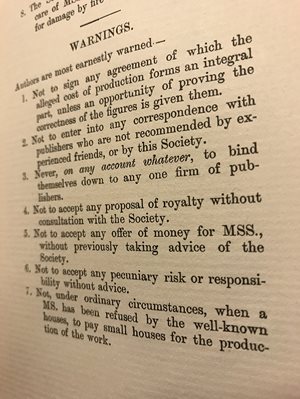18 December 2018
This month, we’re taking a look back at some of the topics covered in our Before You Sign blogs from 2018, before we turn our attention to a new year.
The aim of this series is to look beyond the central question of the financial terms you might be committing to when dealing with a publisher or producer, at the less immediate – but no less important -matters that members and creators should consider in their work. It also ties in with our ongoing C.R.E.A.T.O.R. campaign, where we work to address the imbalance of poor contract terms by negotiating with publishers and by pushing for legislative reform.
Here is a small reminder of the topics covered in 2018, and how they reflect the principles of our C.R.E.A.T.O.R. campaign.
Whose right is it anyway?
Sometimes you will be in the position of the rights holder, allowing other people to use your material; sometimes you will be in the role of potential user seeking consent from others – including other authors. We have Before You Sign blogs on what to bear in mind if you are collaborating on a project with someone else; if you are interviewing someone – or they are interviewing you; and when/how to obtain permission if quoting other people’s words or images in your work. These reinforce the ‘O’ in C.R.E.A.T.O.R.: ensuring proper respect for the rightful copyright owner.
Publishers and other producers sometimes sit on works when they have ceased to actively to exploit them. Here you can read about when and how you might be able to get your rights back. It’s also useful to be aware of contract terms that could shackle you more widely – the publisher taking first refusal on your next book, or demanding that you do not write a ‘competing’ work for anyone else, or having the freedom to revise your title in future without involving you.
Know your value
And, importantly, never undervalue yourself – authors are sometimes expected to do work for free – e.g. for what the commissioner deems a good cause, such as a charity. But your writing activities are how you earn a living, and the fact that you are sought-after in this way means your involvement is of value per se. Whether or not you support a particular cause, make it clear that your support is worth something, and asked to be acknowledged for its value. The first ‘R’ in C.R.E.A.T.O.R. is for fair and equitable remuneration, the ‘E’ is an obligation on the user to exploit the material (or give it back to you), and the second ‘R’ is for contract terms to be reasonable.
Where do I go from here?
As authors go out and about at the start of their literary lives and even when they’ve become established, other considerations come into play. We have guidance on how to protect your rights when participating in workshops and writing groups, and what you need to know – in terms of the law, the logistics, and more subjectively on school visits.
It’s why clearly written contracts are so important – the ‘C’ in our C.R.E.A.T.O.R. campaign – and the best way to minimise misunderstandings and problems later down the line. Again, the ‘O’ in C.R.E.A.T.O.R. is for that which is close to all authors’ hearts: properly recognising ownership of what you have created.
Thinking ahead
It’s not all doom and gloom. Some Before You Sign blogs are not warnings but positive reminders. For instance, during Carers Week this year, we encouraged writers to stay healthy and connected – a reminder of the importance of balancing your time and wellbeing. We also sent out reminders about the Authors’ Licensing and Collecting Society (ALCS) – and many discovered it as a source of unexpected – and well-deserved – income.
Remember, the whole point of the C.R.E.A.T.O.R. campaign is to try to ensure that terms are fair, clear, and reasonable. If you’re unsure and you need to ask for help, contact our advisors.
C – Clarity: Clear contracts, in writing, which set out the exact scope of the rights granted.
R – Remuneration: Fair remuneration, equitable and unwaivable, for all forms of exploitation, including a bestseller clause, so if a work does far better than expected, the creator shares in its success even if copyright was assigned.
E – Exploitation: An obligation upon the publisher to fully exploit the rights it has been granted. Also known as the ‘use it or lose it’ clause, this would see rights returned to the creator if not exploited.
A – Accounting: Fair, understandable and detailed accounting clauses in all contracts to cover royalty payments and other sources of remuneration.
T – Terms: Reasonable contract terms (including time limits) for any licence and regular reviews to take into account new forms of exploitation.
O – Ownership: Authors, including illustrators and translators, should be appropriately credited for all uses of their work and moral rights should be unwaivable.
R – Reasonableness: All contract clauses should be subject to a general test of reasonableness, including a general safeguard that any provision which causes a significant imbalance in the parties’ rights and obligations, to the detriment of the author, shall be regarded as unfair.
 Left photo: Taken from SoA's Warnings to Members (1898)
Left photo: Taken from SoA's Warnings to Members (1898)